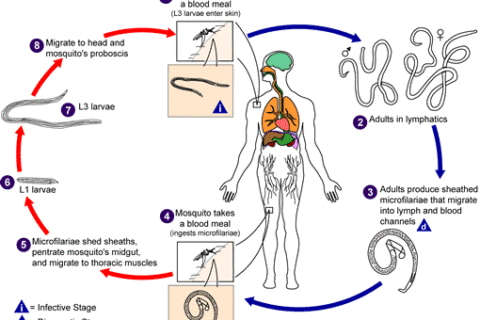Elephantiasis tropica
Elephantiasis is the enlargement and hardening of limbs or body parts due to tissue swelling.[1][2] It is characterised by edema, hypertrophy, and fibrosis of skin and subcutaneous tissues, due to obstruction of lymphatic vessels.[2] It may affect the genitalia.[2] The term elephantiasis is often used in reference to (symptoms caused by) parasitic worm infections,[1][2] but may refer to variety of diseases where parts of a person’s body swell to massive proportions.[2]

Lymphatic filariasis is a human disease caused by parasitic worms known as filarial worms. Most cases of the disease have no symptoms. Some people, however, develop a syndrome called elephantiasis, which is marked by severe swelling in the arms, legs, breasts, or genitals. The skin may become thicker as well, and the condition may become painful. The changes to the body have the potential to harm the person’s social and economic situation.[2]
The worms are spread by the bites of infected mosquitoes. Three types of worms are known to cause the disease: Wuchereria bancrofti, Brugia malayi, and Brugia timori, with Wuchereria bancrofti being the most common. These worms damage the lymphatic system. The disease is diagnosed by microscopic examination of blood collected during the night. The blood is typically examined as a smear after being stained with Giemsa stain. Testing the blood for antibodies against the disease may also permit diagnosis. Other roundworms from the same family are responsible for river blindness.
Causes
Elephantiasis occurs in the presence of microscopic, thread-like parasitic worms such as Wuchereria bancrofti (the most common), Brugia malayi, and Brugia timori (also known as B. timori), all of which are transmitted by bites from infected mosquitoes. It is a type of helminth infection. Three types of worm cause the disease and damage the lymphatic system.
The disease itself is a result of a complex interplay between several factors: the worm, the endosymbiotic Wolbachia bacteria within the worm, the host’s immune response, and the numerous opportunistic infections and disorders that arise. The adult worms only live in the human lymphatic system. The parasite infects the lymph nodes and blocks the flow of lymph throughout the body; this results in chronic lymphedema, most often noted in the lower torso (typically in the legs and genitals).

- “Definition of ELEPHANTIASIS”. www.merriam-webster.com. Retrieved 2018-06-28.
- ^ Jump up to:a b c d e f g h i “elephantiasis”, The Free Dictionary, retrieved 2018-06-28
- ^ Carlson, Emily (27 March 2013). “Taking the ‘Bite’ Out of Vector-Borne Diseases – Inside Life Science Series – National Institute of General Medical Sciences”. publications.nigms.nih.gov. Retrieved 29 November 2016.
- ^ “Lymphedema”. National Cancer Institute. 29 May 2015. Retrieved 29 November 2016.
Wikipedia